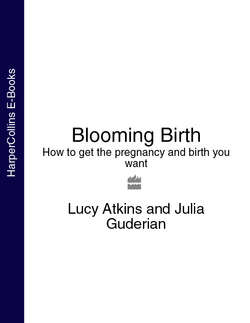Читать книгу Blooming Birth: How to get the pregnancy and birth you want - Lucy Atkins - Страница 45
Fear of having a big baby
ОглавлениеIt is common to be ‘warned’ by doctors or midwives at some time during pregnancy that your baby’s a whopper. The first thing you should know is that all ways of estimating a baby’s weight during pregnancy are just that – estimates. The technical term for a big baby is ‘macrosomic’ – that is, more than about 9lb at birth. Such information may be presented to you as ‘fact’ but it is usually nothing of the kind. Your midwife will measure the size of your belly and feel your uterus during each check up. But this ‘manual palpitation’ can be around 10 per cent wrong in either direction. The latest ultrasound technology can also be up to a couple of pounds out and is generally considered to be better at ‘predicting’ small babies than large ones.
There is some evidence that steep weight gain in the last trimester may be a ‘contributing factor’ in having a bigger baby. But do not beg for a caesarean if you find yourself gaining more than about 1lb a week: much weight gain in the final trimester can be fluid retention. You might, however, want to cut down on sugary foods if you’re gaining very fast (as this may, possibly, affect your baby’s weight). ‘I was told by the hospital that my first baby was big,’ says Kaitlin, 36, mother of three. ‘This panicked me completely – I was scared enough of the birth. It never occurred to me they might be wrong, they seemed so sure. In the end, I had an emergency caesarean because of failure to progress: she was 7lb2oz. I ignored all comments about baby size in my next two pregnancies.’
Even if your baby does turn out to be big, your body will probably cope perfectly well with giving birth to it. Some women will have bigger babies but James Walker, Professor of obstetrics and gynaecology at the University of Leeds Medical School says: ‘Plenty of women give birth to 10lb babies with absolutely no complications.’ He says, ‘Shetland ponies have Shetland ponies’ (in less equine terms this means your baby is likely to be in proportion with you). ‘Both my sons were nearly 10lb,’ says Sarah, who is 5ft 6in. ‘And both births were great. With my second I did not even tear. What’s more, I am not – despite my friends’jokes – the size of the Mersey Tunnel down there.’ Giving birth to a big baby can be tough, but so can giving birth to a 6lb one. So don’t get hung up on your baby’s size. Julia attended a birth where the mother, Grace, a nineteen year old, delivered a 10lb 5oz baby with no drugs. ‘She was so young, and just hadn’t heard all those dramatic birth stories – she just focused on giving birth. And it went just fine, partly I think, because nobody had told her she couldn’t do it.’
POSSIBLE BIG BABY COMPLICATIONS | With big babies there is a slightly higher risk of failure to progress during labour (i.e. when labour stalls or slows down). We talk more about this in Chapter 5: Your Options. There is also a slightly higher risk of shoulder dystocia (where the baby’s shoulder gets stuck) at birth. Delivering your baby on your hands and knees, or in a kneeling position might help (see Chapter 5 for good positions for pushing). But the truth is complicated – births can happen to babies of any size. Risks, with big babies, tend to occur when a baby is particularly fat, not merely large. This mostly happens to diabetic women who can have fatter babies because of higher blood sugar levels during pregnancy. Head size (another myth shattered) is only very rarely a concern. Even big heads fold (normal, honestly: see Chapter 2) as the baby comes out of your vagina, and despite what many of us think about our brainy offspring, it is actually extremely rare for a baby to have a genuinely humungous head.
In other words, if you are told your baby is big (and you’re not diabetic), have confidence in your body’s ability to grow a baby it can cope with, prepare thoroughly for the birth and tell yourself size doesn’t matter.
